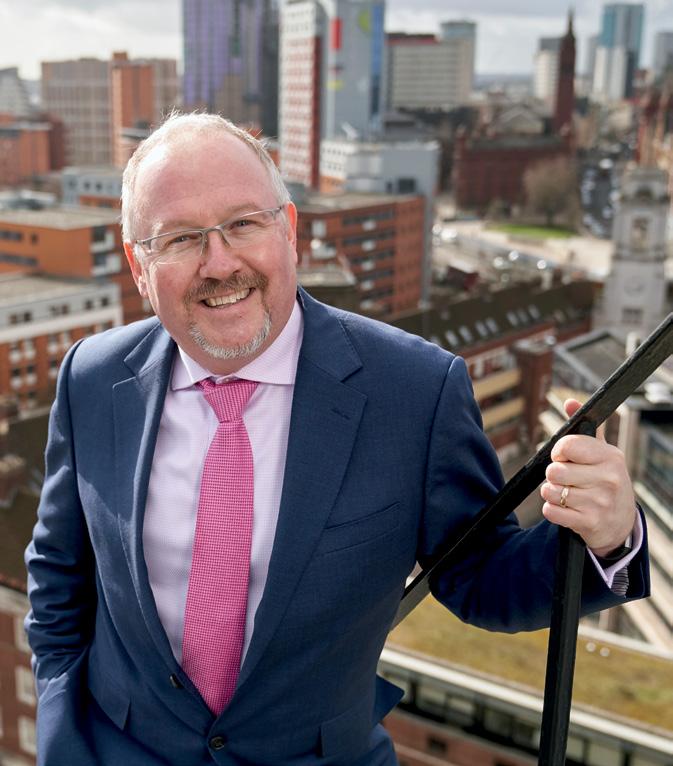
4 minute read
Meet the Exec: Mark Smith
from Aston in Touch 2019
by Aston Alumni
Mark Smith is Executive Director of Business Engagement at Aston University. He works in Birmingham and lives in Cornwall, where he has been a long-standing member of Agile on the Beach: a vibrant coastal conference that explores the latest practices around agile working.

Advertisement
Aston in Touch: What attracted you to working at Aston University?
Mark Smith: My connection with the University goes back to my teenage years when I was at school in Tamworth [in Staffordshire], and we were bussed over to metallurgy lectures on the premises at Aston. My first exposure to a university of any kind was to Aston University. The people at my school were all destined to work in engineering. I was really impressed by the fact that the lecturers were genuinely approachable. They gave us tea and biscuits, and they stayed and chatted about engineering, about metals, about austenitic steels and all these other things. I thought, “Wow, this is what university’s like”. I was about 14 and from that point onwards I decided I was going to go to university. Sadly, I didn’t come to Aston for a variety of reasons, but when the opportunity came to work here I was very proud to be able to join the team and I felt very privileged to be accepted into the executive.
AiT: It has always felt very friendly.
MS: I think it has. We talk about Aston’s reputation for widening participation. To be honest, that’s a modern term for what Aston has always done; it has always had a place in the community. It’s authentic. There are some lovely bits of the Main Building – parquet flooring and traditional brass handles. They’re the kinds of things you might associate with ‘old’, but at the same time it’s a very modern university and it cares about the people who study here and about the businesses that surround it. It has always adapted to the changes in industrial and commercial patterns. I think there’s a warmth and affection for it in Birmingham. Although it doesn’t carry the name of the city any more, it carries the name of a district next to the city and it very much feels like the city’s university.
AiT: Tell me about Agile on the Beach.
MS: Agile on the Beach was set up by two friends of mine, Mike Barritt and Toby Parkins. Toby runs a software firm called Headforwards down in Cornwall and Mike was running and working in a consultancy firm called Oxford Innovation at the time. They came together because agile working methodologies – a decade ago – were not very present in Cornwall, nor was there a Cornwall software industry. I came in as a funder and as somebody running a developmental programme for executive education with Plymouth University called Unlocking Potential. I helped back the initial attendance of Agile on the Beach in a conference of about 60 people. In that ten years it’s grown enormously. We take over the Performance Centre of Falmouth University and it’s called Agile on the Beach because we are in Falmouth, which is a coastal town.
AiT: Do you actually hold the conference on the beach?
MS: Yes, we take them all down to the beach where they can relax and just talk. For software we have many different tracks - team-building software, software craftsmanship, agile in business. We cover a whole range of different areas and we encourage people to come and share their practice. It’s a community of interests, but people share a common interest in evolving or moving forward agile practices. Every year 450 people go away from Agile on the Beach having swapped ideas from different industries. It’s a fantastically rejuvenating thing to do. I’m proud to have been involved in it since the inception, though I was not a founder of it. I’ve become someone who has helped build and grow it over that period and it’s a really nice part of my life which appeals to my inner geek.
AiT: What do you think Aston does best in terms of business engagement?
MS: I do think it’s very good at listening to the needs of businesses and it can react quickly. I think the most tangible example of that recently has been the growth of the cybersecurity degree from the Computer Science department. The degree has been supported across the University by different levels of expertise and people have engaged with a wide range of businesses to adapt and deliver it in very short order. The best validation for this approach has been the fact that as soon as it was advertised, there was an unprecedented flurry of applications. I don’t want to give the false impression that we always move quickly because sometimes we are cautious, but I think, nonetheless, industry understands it can come and talk to Aston University. We can help businesses to deal with changing skills requirements, and we can help them understand what opportunities are out there.
AiT: How is the University progressing with degree apprenticeships?
MS: Really well. I think the nicest thing about degree apprenticeships is that they fit with Aston’s core philosophy. As you know, almost three quarters of our courses have a placement of some kind associated with them. So learning at work has been part of Aston’s reason to be – since the start. When the idea of degree apprenticeships re-emerged recently it was nice because it allowed us to take another route into doing what we’re really good at. I think the challenge with degree apprenticeships is making sure that people still feel part of the University when they’re in work. I think people need to be reassured that degree apprenticeship students are still part of that love, warmth and affection that carries itself around the University, even though they are working remotely four-fifths of the time. The degree apprenticeship way of teaching is remarkably flexible. The models that we use for degree apprenticeships in the UK could be used overseas as well, to provide support to people around the world.

Mark Smith joined Aston University in 2018 from Birmingham City University where he was Director of Enterprise and Employability. His career has involved working across diverse areas including Government, regeneration and online education, taking on big projects including establishing new airports and fostering enterprise in inner-city areas.






